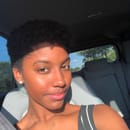Gabriella Alexander, or more commonly known as Gaby, is a first-year psychology major at Florida State University. Her mother is Puerto Rican and her father is St. Lucian. As the daughter of an interracial couple growing up in America, finding inner and outer acceptance of her identity was not an easy journey. However, it is one she says she “would never change for the world.” This is her story.

Gabriella Alexander (GA): Miami is a melting pot of people from so many different places. Growing up there definitely helped me to embrace my racial/ethnic identity, specifically as an Afro-Latina.
HC: Did you ever feel a sense of alienation from your friends or peers because of your racial identity?
GA: Yes, most definitely. In a place where white males are predominant, I found it hard to find a space where my existence didn’t feel like some unusual occasion, mishap or rare sighting. Going to a predominantly white school normalized this feeling. As I grew up, however, I didn’t expect that same sort of “out of place” feeling to also be present when it came to interacting with people who identified as racially similar to me. For example, with black people, I was “too Hispanic to be black” and with Hispanic people, I was “too black to be Hispanic.” Because of this I always felt like I occupied this weird spot in society where I was both and neither races at the same time.

GA: No, actually. For a while when I was younger, I only wanted to acknowledge that I was Hispanic, and I never wanted to admit that I was black. Growing up, it was very apparent to me how uncomfortable people were just being around people of darker skin. For example, whenever the topic of slavery came up in History class, all eyes suddenly gravitated to the one or two warmer skin-toned students in the class. While I was too young to be cognizant of it at the time, those kinds of things were detrimental to my self-esteem to the point where I did not even want to associate with that side of my identity at all.
HC: What was the pivotal moment where you began accepting or changing your mindset regarding your racial identity?
GA: I think it was around the time where I moved out of the suburbs and into downtown Miami at the start of my high school career. Going to a school that puts an emphasis on your art and on your talent rather than how you looked was a breath of fresh air I didn’t know I desperately needed. In my sophomore year, I also took a trip to St. Lucia where my world completely changed. The culture was just so rich and pure and beautiful. Through that entire trip, I was so proud of where I came from and I was so proud that this was what was part of my identity. My blackness was something that I was hiding for years, and I realized that I did not have to be afraid or ashamed of it. So back in Miami that was when I started developing friendships in the Latinx community, and ultimately how I came across the concept of Afro Latina.
HC: In what ways have you embraced your identity following this realization?
GA: Getting involved with organizations at FSU that reflect who I am has gotten me acclimated to attending a PWI. Before I came, I was worried that I wouldn’t find my people. Associating with people in the Black Student Union and with Azucar Dance Company as well as being a part of band ensembles has helped me to be more comfortable in not just my ethnicity, but my personhood. Learning to dance Bachata, understanding the poetry behind rap music and falling in love with classical music have all shown me that my mixed-race does not define who I am. Yes, I am mixed. But so what? It doesn’t diminish my ability to do well in school or to associate with the people I want to or even hold positions of leadership.
HC: What do you have to say to all young mixed-raced girls out there regarding their identity and a sense of belonging in this world?
GA: You are beautiful. Never be afraid of who you are just because you are born into a world that subliminally or outright tells you that your presence is off-putting. Being mixed race does not mean you are more of one race than another. It is okay to proudly stand by both. There is a certain hidden beauty to being mixed race that I personally have gotten the pleasure to discover. Having two cultures has brought a lot of perspective in my life. Exploring both sides of my heritage has made me more adventurous, globally conscious, and culturally aware. In a polarizing time where politics tend to pit one race against another, we need to be voices of unity and love.

Want to see more HCFSU? Be sure to like us on Facebook and follow us on Instagram, Twitter and Pinterest!



